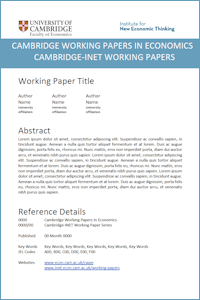
Leung, B. T. K.
Learning in a Small/Big World
WP Number: 2039
Abstract: This paper looks into how learning behavior changes with the complexity of the inference problem and the individual's cognitive ability, as I compare the optimal learning behavior with bounded memory in small and big worlds. A learning problem is a small world if the state space is much smaller than the size of the bounded memory and is a big world otherwise. I show that first, optimal learning behavior is almost Bayesian in small worlds but is significantly different from Bayesian in big worlds. Second, ignorant learning behaviors, e.g., availability heuristic, correlation neglect, persistent over-confident, are never optimal in small worlds but could be optimal in big worlds. Third, different individuals are bound to agree in small worlds but could disagree and even be bound to disagree in big worlds. These results suggest that the complexity of a learning problem, relative to the cognitive ability of individuals, could explain a wide range of abnormalities in learning behavior.
Keywords: Learning, Bounded Memory, Bayesian, Ignorance, Disagreement
JEL Codes: D83 D91
Author links:
PDF: wp2039.pdf 
Open Access Link: 10.17863/CAM.61846
